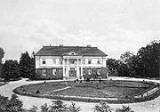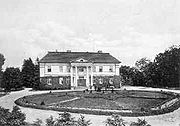
Rodryg Dunin
Encyclopedia
Rodryg Dunin was a Polish
noble (szlachta
), a hrabia
(Count
), and an industrialist and agriculturalist. His work in agricultural industry, including pioneering new techniques, earned him recognition among the farming circles of early 20th century Greater Poland
.
 Rodryg Dunin was born in Marszewo, Kreis Pleschen
Rodryg Dunin was born in Marszewo, Kreis Pleschen
, Province of Posen
, to Stanisław Tadeusz Dunin (a participant in the 19th century January Uprising
), and Maria-Antonina Baranowska (daughter of the Poznań
playwright Agnieszka Baranowska
). He was a student at Maria Magdalena Gymnasium (high school) in Poznań
, where he participated actively in a secret Polish educational-social youth movement, and later studied at academies in Tetschen (Děčín)
, Bohemia
, and Leipzig
, Saxony
.
He married Lucia (Łucja) Taczanowska (1862-1917), the widow of Stanisław Nieżychowski (1851-1897), and became the stepfather of her six children. Among his own children by the marriage was Stanisław Antoni Piotr Dunin
, an army officer who received the Virtuti Militari
award.
, Kreis Kosten. Formerly the seat of the Nieżychowski family, it came into the hands of the Dunins following the 1898 marriage. The mansion was built by Nepomucen Nieżychowski, who owned the estate at the time. In 1923, he passed Granówek to his oldest stepson, Józef Nieżychowski, and bought the Ruchocice
manor near Grodzisk Wielkopolski
from Tiedemann, an HKT
member. Dunin would later use Ruchocice to provide an orphanage
aiming to protect Polish children from Germanization.
area. He mentored young farmers and was invited to lecture in contemporary centers of farmer education, both in Poznan and Warsaw
.
Poland
Poland , officially the Republic of Poland , is a country in Central Europe bordered by Germany to the west; the Czech Republic and Slovakia to the south; Ukraine, Belarus and Lithuania to the east; and the Baltic Sea and Kaliningrad Oblast, a Russian exclave, to the north...
noble (szlachta
Szlachta
The szlachta was a legally privileged noble class with origins in the Kingdom of Poland. It gained considerable institutional privileges during the 1333-1370 reign of Casimir the Great. In 1413, following a series of tentative personal unions between the Grand Duchy of Lithuania and the Kingdom of...
), a hrabia
Hrabia
Hrabia is the title used for a rank of Polish nobility roughly corresponding to that of a Count. An earlier counterpart, komes, was used for a non-hereditary office in Piast Poland and faded from use before the establishment of the Polish-Lithuanian Commonwealth.The wife of a hrabia is a hrabina,...
(Count
Count
A count or countess is an aristocratic nobleman in European countries. The word count came into English from the French comte, itself from Latin comes—in its accusative comitem—meaning "companion", and later "companion of the emperor, delegate of the emperor". The adjective form of the word is...
), and an industrialist and agriculturalist. His work in agricultural industry, including pioneering new techniques, earned him recognition among the farming circles of early 20th century Greater Poland
Greater Poland
Greater Poland or Great Poland, often known by its Polish name Wielkopolska is a historical region of west-central Poland. Its chief city is Poznań.The boundaries of Greater Poland have varied somewhat throughout history...
.
Biography

Kreis Pleschen
Kreis Pleschen was a county in the southern administrative district of Posen, in the Prussian province of Posen. It presently lies in the south-eastern part of Polish region of Greater Poland Voivodeship....
, Province of Posen
Province of Posen
The Province of Posen was a province of Prussia from 1848–1918 and as such part of the German Empire from 1871 to 1918. The area was about 29,000 km2....
, to Stanisław Tadeusz Dunin (a participant in the 19th century January Uprising
January Uprising
The January Uprising was an uprising in the former Polish-Lithuanian Commonwealth against the Russian Empire...
), and Maria-Antonina Baranowska (daughter of the Poznań
Poznan
Poznań is a city on the Warta river in west-central Poland, with a population of 556,022 in June 2009. It is among the oldest cities in Poland, and was one of the most important centres in the early Polish state, whose first rulers were buried at Poznań's cathedral. It is sometimes claimed to be...
playwright Agnieszka Baranowska
Agnieszka Baranowska
Agnieszka Lipska Baranowska was a Polish playwright and poet.Born on April 16, 1819 in Gostków near Łęczyca in a Polish szlachta family of Lipscy to Jacob Lipski and Marjania Zaluska, she spent her life in the Prussian partition, including the Grand Duchy of Poznań...
). He was a student at Maria Magdalena Gymnasium (high school) in Poznań
Poznan
Poznań is a city on the Warta river in west-central Poland, with a population of 556,022 in June 2009. It is among the oldest cities in Poland, and was one of the most important centres in the early Polish state, whose first rulers were buried at Poznań's cathedral. It is sometimes claimed to be...
, where he participated actively in a secret Polish educational-social youth movement, and later studied at academies in Tetschen (Děčín)
Decín
Děčín is a town in the Ústí nad Labem Region in the north of the Czech Republic. It is the largest town and administrative seat of the Děčín District.-Geography:...
, Bohemia
Bohemia
Bohemia is a historical region in central Europe, occupying the western two-thirds of the traditional Czech Lands. It is located in the contemporary Czech Republic with its capital in Prague...
, and Leipzig
Leipzig
Leipzig Leipzig has always been a trade city, situated during the time of the Holy Roman Empire at the intersection of the Via Regia and Via Imperii, two important trade routes. At one time, Leipzig was one of the major European centres of learning and culture in fields such as music and publishing...
, Saxony
Kingdom of Saxony
The Kingdom of Saxony , lasting between 1806 and 1918, was an independent member of a number of historical confederacies in Napoleonic through post-Napoleonic Germany. From 1871 it was part of the German Empire. It became a Free state in the era of Weimar Republic in 1918 after the end of World War...
.
He married Lucia (Łucja) Taczanowska (1862-1917), the widow of Stanisław Nieżychowski (1851-1897), and became the stepfather of her six children. Among his own children by the marriage was Stanisław Antoni Piotr Dunin
Antoni Dunin
Antoni Dunin was a Polish nobleman , a Hrabia , and an army officer who received the Virtuti Militari award.- Biography :...
, an army officer who received the Virtuti Militari
Virtuti Militari
The Order Wojenny Virtuti Militari is Poland's highest military decoration for heroism and courage in the face of the enemy at war...
award.
Estate
Rodryg Dunin's estate was in GranówkoGranówko
Granówko is a village in the administrative district of Gmina Granowo, within Grodzisk Wielkopolski County, Greater Poland Voivodeship, in west-central Poland. It lies approximately south-east of Granowo, east of Grodzisk Wielkopolski, and south-west of the regional capital Poznań.An old...
, Kreis Kosten. Formerly the seat of the Nieżychowski family, it came into the hands of the Dunins following the 1898 marriage. The mansion was built by Nepomucen Nieżychowski, who owned the estate at the time. In 1923, he passed Granówek to his oldest stepson, Józef Nieżychowski, and bought the Ruchocice
Ruchocice
Ruchocice is a village in the administrative district of Gmina Rakoniewice, within Grodzisk Wielkopolski County, Greater Poland Voivodeship, in west-central Poland. It lies approximately north-east of Rakoniewice, south of Grodzisk Wielkopolski, and south-west of the regional capital...
manor near Grodzisk Wielkopolski
Grodzisk Wielkopolski
Grodzisk Wielkopolski is a town in western Poland, in Greater Poland Voivodeship , with a population of 13,703 . It is south-west of Poznań, the voivodeship capital. It is the seat of Grodzisk Wielkopolski County, and also of the smaller administrative district called Gmina Grodzisk Wielkopolski...
from Tiedemann, an HKT
German Eastern Marches Society
German Eastern Marches Society was a German radical, extremely nationalist xenophobic organization founded in 1894. Mainly among Poles, it was sometimes known acronymically as Hakata or H-K-T after its founders von Hansemann, Kennemann and von Tiedemann...
member. Dunin would later use Ruchocice to provide an orphanage
Orphanage
An orphanage is a residential institution devoted to the care of orphans – children whose parents are deceased or otherwise unable or unwilling to care for them...
aiming to protect Polish children from Germanization.
Industry and agriculture
Dunin played an important role in Greater Poland agricultural-industrial organizations, including serving as a councillor of the Poznańskie Ziemstwo Kredytowe and holding seats on the boards of numerous institutions. His capacity to both introduce new techniques and to balance with tradition earned him a reputation among Polish farmers for modernity and innovation. He founded an alcohol factory, local train, and in 1912 installed the first rain-based irrigation system in the PoznanPoznan
Poznań is a city on the Warta river in west-central Poland, with a population of 556,022 in June 2009. It is among the oldest cities in Poland, and was one of the most important centres in the early Polish state, whose first rulers were buried at Poznań's cathedral. It is sometimes claimed to be...
area. He mentored young farmers and was invited to lecture in contemporary centers of farmer education, both in Poznan and Warsaw
Warsaw
Warsaw is the capital and largest city of Poland. It is located on the Vistula River, roughly from the Baltic Sea and from the Carpathian Mountains. Its population in 2010 was estimated at 1,716,855 residents with a greater metropolitan area of 2,631,902 residents, making Warsaw the 10th most...
.

